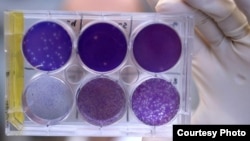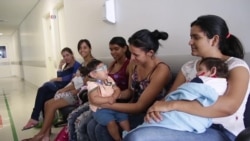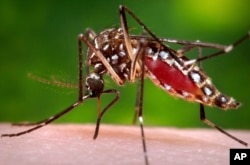A new "dipstick" serum test to quickly and cheaply determine whether a person is infected with Zika could lead to better health care for women with the virus, which can cause birth defects, said scientists.
The simple paper strips — which can be used to test for four subtypes of dengue as well as Zika — could also provide "early warning" of the spread of pathogens, said scientists who are exploring ways to commercialize the technology.
Kimberly Hamad-Schifferli, associate professor of engineering at the University of Massachusetts Boston, said it resembles a pregnancy test.
"You simply dunk it in a solution with a human sample and the fluid leaks through — two spots means it's positive and one spot means it's negative," she told the Thomson Reuters Foundation.
Watch: New Dipstick Test Quickly Discovers People with Zika Virus
Cost target
The test is designed for use in developing countries, and the aim is for it to cost less than $1 per strip, she added. The lab cost is currently about $5.
The research, published in the journal Science Translational Medicine, involved more than 50 scientists. It tested serum from people in Latin America and India to determine infections by the various viruses.
Transmitted by the Aedes aegypti mosquito, the symptoms of dengue, Zika and yellow fever can appear very similar, including fevers, headaches, and aching joints and muscles.
But pregnant women infected with Zika risk having babies with the birth defect microcephaly, which is defined by an unusually small head and can result in developmental problems and other severe brain abnormalities.
The Zika epidemic that hit Brazil in 2015 left thousands of babies suffering from birth defects.
"Knowing whether these tests are positive or negative is very important for designing the course of clinical care," said Lee Gehrke, professor in the Institute for Medical Engineering and Science at the Massachusetts Institute of Technology. "It simplifies the decision tree and, we believe, leads to improved patient care."
MIT, whose scientists led the research, is looking to patent the technology and obtain regulatory approval for the antigen-based test.
No false positives
Scientists said the test had been proven not to "cross-react," meaning it did not show a false positive for a closely related virus rather than the one being tested for.
It requires little technical skill and could be used on blood as well as serum samples, they added.
Besides diagnosing patients in clinics and hospitals, the dipstick tests could also be used to alert public health services if new serotypes of dengue, for example, arrive in a particular place, said Gehrke.
"If a new serotype is introduced into an area, it can cause an outbreak because [people's] immune systems do not protect them from the new virus," he said.
There is currently no treatment for Zika infection. Companies and scientists are racing to develop a safe, effective vaccine, but a preventative shot is not expected to be ready for widespread use for at least two or three years.
Endemic in Latin America and Asia, dengue infects hundreds of millions of people each year, and is becoming more prevalent.
There is no dedicated treatment for the virus, which is usually found in urban and semiurban areas.









